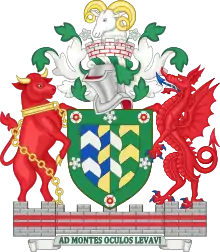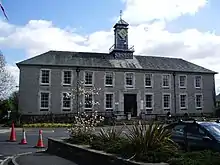Cumbria County Council
Cumbria County Council is the county council of Cumbria, a county in the North West of England. Established in 1974, following its first elections held a year before that, it is an elected local government body responsible for the most significant local services in the county, including county schools, county roads, and social services.
Cumbria County Council | |
|---|---|
 Arms of Cumbria County Council | |
 Council logo | |
| Type | |
| Type | |
| Leadership | |
Chair of the Council | |
Leader of the Council | Cllr Stewart Young, Labour |
Chief executive | Katherine Fairclough since 1st March 2017 |
| Structure | |
| Seats | 84 (43 needed for a majority) |
 | |
Political groups |
|
Length of term | 4 years |
| Elections | |
| First-past-the-post | |
Last election | 4 May 2017 |
Next election | 2021 |
| Website | |
| www | |
.jpg.webp)

Creation
In 1974, under the Local Government Act 1972, the administrative counties of Cumberland and Westmorland and the county borough of Carlisle were abolished, and the areas they covered were combined with parts of Lancashire and the West Riding of Yorkshire to form a new non-metropolitan county called Cumbria.[1]
Functions
Cumbria County Council is responsible for the more strategic local services of the county, including education (schools, both primary and secondary), libraries and youth services, social services, highway maintenance, waste disposal, emergency planning, consumer protection, and town and country planning for minerals matters, waste and for highways. This makes it a substantial employer.
The former Cumberland County Council's final major road scheme, an A66 bypass for Keswick, was prepared by Scott Wilson Kirkpatrick, consulting engineers, in 1972,[2] and construction began in the summer of 1974, with the new authority completing the scheme.[3]
The Council operates various recycling and waste disposal facilities across the area. In January 2012, the Council announced plans to close six of these centres. The six sites identified by the review as most suitable for closure are at Ambleside, Brampton, Grange-over-Sands, Kirkby Stephen, Millom and Wigton.[4]
Although the administrative offices are at Cumbria House in Botchergate, Carlisle, formal meetings of the Council are held at the County Offices in Kendal.[5]
History
Control of the council has swung back and forth. In its first four years (1973-1977) there was no overall control, but in 1977 the Conservatives gained a majority. In 1981, this became a majority for Labour, and from 1985 there was again no one-party control. In 1997, Labour again took control, but lost it in 2001. Since then, no party has had a majority.
A proposal for Cumbria to become a unitary authority was made in 2007,[6] and Cumbria went into consultation, with opposition coming from the district councils which would be abolished: Allerdale, Barrow-in-Furness, Carlisle, Copeland, Eden, and South Lakeland.[7] In the event, the county was left out of the 2009 structural changes to local government in England.[8]
In 2008, the county council rejected a proposal to introduce a directly elected mayor, opting instead for a cabinet-style administration that resembled the status quo.[9] During the same year, an administration of Conservatives and Liberal Democrats collapsed, suffering not least from lacking a majority in the council. Thirty-nine Labour members and three Independents exactly equalled the total of thirty-two Conservatives and ten Liberal Democrats. A minority Labour administration then took over running the council until the June 2009 elections, when a net gain of one seat from the Independents led to the creation of a new Conservative and Labour coalition.[10]
In 2020 the council approved Whitehaven coal mine for a third time. It will be the first deep coal mine in the UK in 30 years. The approval was widely criticised for its environmental damage and carbon emissions. Westmorland and Lonsdale MP Tim Farron described the coal mine as a "complete disaster for our children's future".[11][12][13]
Elections
The first elections to the authority were in 1973, and members have been elected since then every four years for a four-year term of office, with elections being held all together on the "first past the post" system.
Since boundary changes in 2001, 84 councillors have been elected from 84 single-member electoral divisions.[14]
At the June 2009 elections, the outcome was 38 Conservatives members, 24 Labour, 16 Liberal Democrats and six Independents. A Labour-Conservative coalition was formed.
Following the May 2013 elections the outcome was 35 Labour members, 26 Conservative, 16 Liberal Democrats and 7 Independents. A Labour-Lib Dem coalition was formed.[15] Following the May 2017 elections, the outcome was 37 Conservative, 26 Labour, 16 Liberal Democrats and 5 Independents, resulting in a Labour-Lib Dem coalition with support from Independent members.[16]
Political control
Since 1973 the political control of the council has been as follows:[17]
| Party in control | Years |
|---|---|
| No overall control | 1973–1977 |
| Conservative | 1977–1981 |
| Labour | 1981–1985 |
| No overall control | 1985–1997 |
| Labour | 1997–2001 |
| No overall control | 2001–present |
Notable members
- Tim Westoll, first chairman of the council, previously chairman of Cumberland County Council from 1959 to 1974.[18]
Notes
- Local government in England and Wales: A Guide to the New System. London: HMSO. 1974. ISBN 0-11-750847-0.
- Civil engineering and public works review, vol. 67, Issues 792-797 (1972), p. 715
- Tony Aldous, Goodbye Britain? (1975), p. 171
- "Cumbria County Council plans recycling overhaul". BBC News. 15 January 2012.
- "Full Constitution" (PDF). Cumbria County Council. p. 3. Retrieved 1 September 2019.
- "County council in favour of unitary authority". Cumberland and Westmorland Herald. 19 January 2007. Retrieved 3 January 2017.
- Julian Whittle (30 March 2007). "Big step forward for unitary authority bid". The Whitehaven News. Archived from the original on 5 May 2013. Retrieved 1 January 2011.
- "Woolas announces sixteen successful bids for unitary status to improve local services". eGove monitor. 27 March 2007. Archived from the original on 27 December 2007. Retrieved 2011-01-01.
- "Council rules out elected mayor". BBC News. 14 September 2008. Retrieved 1 January 2011.
- Julian Whittle, Political fight begins for control of Cumbria council Archived 22 March 2012 at the Wayback Machine dated 12 May 2009 at newsandstar.co.uk, accessed 1 January 2011
- "Whitehaven coal mine approved for third time". BBC News. 3 October 2020. Retrieved 7 January 2021.
- "Whitehaven coal mine: Government refuses to call in plans". BBC News. 6 January 2021. Retrieved 7 January 2021.
- Media, P. A. (6 January 2021). "Jenrick criticised over decision not to block new Cumbria coal mine". The Guardian. Retrieved 7 January 2021.
- "Welcome to Council and Democracy". Cumbria County Council. Retrieved 1 January 2011.
- "Cumbria County Council approves coalition deal". BBC. Retrieved 24 May 2013.
- "Cumbria County Council announce new political administration". Cumbria County Council. Retrieved 3 July 2017.
- "Cumbria". BBC News Online. 19 April 2009. Retrieved 1 January 2011.
- Elizabeth Hughes, Obituary: Tim Westoll, dated 12 February 1999, in The Independent online
| Wikimedia Commons has media related to Cumbria County Council. |